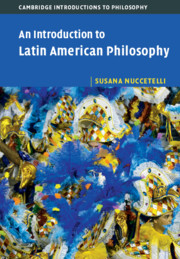Book contents
- An Introduction to Latin American Philosophy
- An Introduction to Latin American Philosophy
- Copyright page
- Dedication
- Contents
- Tables
- Preface
- 1 Setting the Scene: The Iberian Conquest
- 2 Modest and Immodest Feminism
- 3 The Authoritarian Republicanism of Bolívar
- 4 The Liberal Republicanism of Sarmiento and Alberdi
- 5 Homegrown and Imported Positivism
- 6 Martí’s Liberal Anti-Positivism
- 7 Utopian Latin Americanism: Arielism and Mestizofilia
- 8 Soft and Hard Socialism
- 9 Liberation Theology and Philosophy
- 10 Skepticism and Anti-Skepticism About Latin American Philosophy
- Glossary
- Bibliography
- Index of Names and Subjects
- References
8 - Soft and Hard Socialism
Published online by Cambridge University Press: 15 October 2020
- An Introduction to Latin American Philosophy
- An Introduction to Latin American Philosophy
- Copyright page
- Dedication
- Contents
- Tables
- Preface
- 1 Setting the Scene: The Iberian Conquest
- 2 Modest and Immodest Feminism
- 3 The Authoritarian Republicanism of Bolívar
- 4 The Liberal Republicanism of Sarmiento and Alberdi
- 5 Homegrown and Imported Positivism
- 6 Martí’s Liberal Anti-Positivism
- 7 Utopian Latin Americanism: Arielism and Mestizofilia
- 8 Soft and Hard Socialism
- 9 Liberation Theology and Philosophy
- 10 Skepticism and Anti-Skepticism About Latin American Philosophy
- Glossary
- Bibliography
- Index of Names and Subjects
- References
Summary
The twentieth century saw a renewed interest among Latin America’s philosophical thinkers on questions concerning social justice, economic underdevelopment, and the imperialist threat from industrial powers in the region. After outlining Marxism as a political theory, Chapter 8 first discusses how Latin American political thinkers José Carlos Mariátegui and Ernesto “Che” Guevara introduced their own twists to Marxism in order to solve those questions. The chapter evaluates Mariátegui’s attempted solution, especially as formulated in his account of the problems of “the Indian,” “the land,” and “religion” facing Peru. In the case of Guevara, the chapter looks closely at his “theory of the new human being,” pointing to some major objections facing it. By contrast, for Salvador Allende and Víctor Raúl Haya de la Torre, the two moderate socialists of Latin America discussed here, solutions are attainable within the framework of liberal democracy, with no violent revolution necessary. This chapter critically examines their claims that the cause of Latin America’s failed experiments with democracy resides elsewhere – namely, in the imperialist threat from the United States and other industrial powers.
Keywords
- Type
- Chapter
- Information
- An Introduction to Latin American Philosophy , pp. 173 - 203Publisher: Cambridge University PressPrint publication year: 2020



